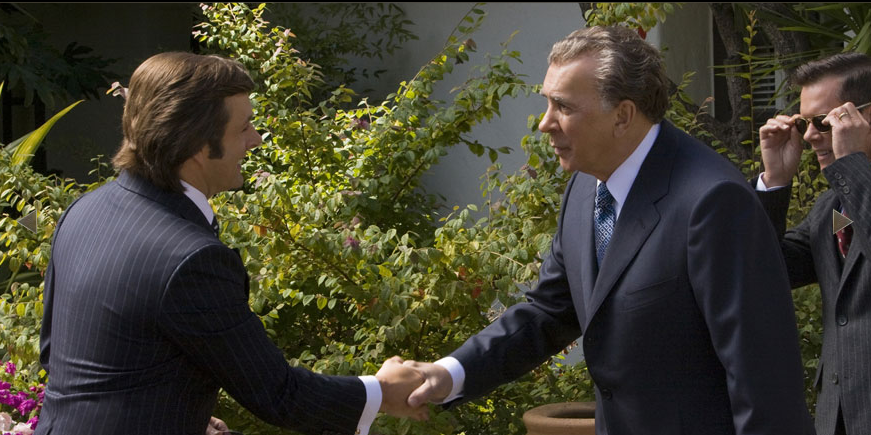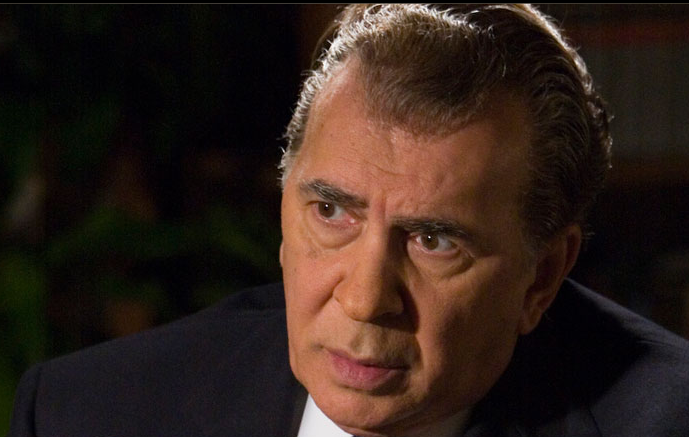 Watergate.
Watergate.
Lest you doubt the power of a single word, consider that one for a few moments. What other words come to mind? What images does it evoke? What emotions do you feel when you hear that word?
Your responses are inescapably informed by your age, i.e., whether you are old enough to have lived through the Watergate scandal, headline by headline.
Yesterday was my birthday and I really wanted to spend part of it seeing Frost/Nixon. (I have been a fan of Frank Langella’s work since he portrayed a young, sexy Dracula in 1979.) Since Frost/Nixon is not yet in wide release, we schlepped about 50 miles in the pouring rain to the closest movie theater offering an afternoon showing. It was well worth the trip.
The death of Deep Throat, W. Mark Felt, at the age of 95 this past Friday, December 19, was on our minds as we navigated the freeways. And earlier last week, when I announced my intent to see the movie while on vacation, I inevitably wound up playing the “Where were you when . . . ?” game with a couple colleagues. I ended up playing it again with BigBob while we inched our way past the cars clogging the freeway as they attempted to exit near the region’s largest and most popular mall.
For the record, on August 8, 1974, I was 17 years old and two months or so post-high school graduation. I spent that summer working at Straw Hat Pizza for the then-minimum wage of two dollars per hour. Predictably, there were no customers in the restaurant that night. Not one. So I reasonably believed that the employees would be allowed to spend a few moments in the dining room gathered around the television there in order to witness the historic moment when a United States President resigned the office for the first time. Instead, the manager and assistant manager, making an impact upon me that they could never have foreseen, refused my request. They sat down in the dining room with a couple of beers while the cartoons that ran incessantly on the large screen television droned on, uninterrupted. They couldn’t have been less interested in the history being written that night. They informed me that if I insisted on listening to President Nixon tell the nation “I shall leave this office with regret at not completing my term, but with gratitude for the privilege of serving as your President . . .” I could take the AM/FM radio I was holding in my hand (I brought it with me to work just in case) to the back room and listen while washing pizza pans. So that’s precisely what I did. I listened to a radio broadcast of the speech while up to my elbows in a disgusting mixture of soapy water and tomato paste, determined that would be the first and last time I ever worked in a restaurant of any sort. (It was.)
 We all know the scandal that ultimately brought down a Presidency was named after the hotel suite into which burglars crept on June 17, 1972, in order to steal information about President Nixon’s would-be opponents in the upcoming election from the Democratic National Committee. But have you ever wondered how the hotel itself came to be named “Watergate” and forever synonymous with both political scandal and the legendary investigative journalism of Robert Woodward, Carl Bernstein, and their unsung colleagues?
We all know the scandal that ultimately brought down a Presidency was named after the hotel suite into which burglars crept on June 17, 1972, in order to steal information about President Nixon’s would-be opponents in the upcoming election from the Democratic National Committee. But have you ever wondered how the hotel itself came to be named “Watergate” and forever synonymous with both political scandal and the legendary investigative journalism of Robert Woodward, Carl Bernstein, and their unsung colleagues?
Beginning in 1935, concerts were held in Washington D.C. at a venue known as the Water Gate. Two years after the Arlington Memorial Bridge was constructed, the road along the river was closed to through traffic. Audience members assembled on the 40 stone steps leading up to the Lincoln Memorial and folding chairs set up on the roadway. Those steps were originally conceived as a ceremonial entrance to the city where visiting dignitaries could disembark from a water-powered vessel and make a grand entrance. Thus, quite literally, they were designed to serve as a Water Gate to the nation’s capitol. Instead, on the deck of a barge rented from the Navy, the National Symphony Orchestra performed Tchaikovsky’s “1812 Overture.” “Sunset Symphonies,” sponsored by the National Park Service, featured performances by the Army, Navy, Marine Corps, and Army Air Forces bands, Frank Sinatra, and Paul Robeson. The concerts ended in 1965 when noise from the planes landing at and taking off from National Airport made it impossible to hear the music. According to local legend, members of the trumpet section played “Taps” while the barge that had served as a stage was towed away.
There was also a restaurant in town called the Water Gate Inn which featured Pennsylvania Dutch cuisine from 1942 until 1966 when it was torn down to accommodate construction of the Kennedy Center for the Performing Arts.
It is believed that the hotel and office complex, Washington D.C.,’s first major international real estate development, as well as the old restaurant, was named after the steps on which so many folks enjoyed summer evening musical performances. How the name was transformed into the one syllable “Watergate,” however, remains unknown.
Watergate East is considered the first major construction job to have widely employed computer technology: A forerunner of computer-aided drafting (CAD) technology was utilized to design irregular windows and wall panels in a building boasting “no continuous straight lines anywhere,” and different facades and curves on every floor. Ironically, the structural design, along with the “elaborate electronic security system” that included “closed-circuit televisions, two-way radios, and a 24-hour security staff” was lauded as a deterrent to crime. “What all of this means is that intruders will have difficulty getting onto the grounds undetected,” the Washington Star wrote.
During the Nixon administration, nearly one-fourth of the Cabinet, along with many other White House staff members resided there. So many employees moved in that it was nicknamed “Administration Arms” or “White House West.” They included Rose Mary Woods, Nixon’s secretary from 1951 through the end of his political career, who claimed responsibility for erasing five of the missing 18 and a half minutes of audiotape. In yet another strange twist of fate, Woods’ apartment was the site of the first-ever burglary in the building. A papal medal and jewelry were stolen from her apartment.
Another famous resident? Monica Lewinsky resided there while interning in the Clinton White House.
The Watergate has always tried to avoid its association with what remains the biggest political scandal in United States history, preferring to be known as an upscale residential and commercial complex that evicted several retail tenants who attempted to capitalize on the controversy by selling memorabilia and encouraging eager tourists. In fact, as of this writing, you cannot check into the Watergate Hotel. According to its website, it is “undergoing a dramatic renovation” in anticipation of a late 2009 re-opening.
 The power of a single, carefully chosen word cannot be underestimated. In this instance, “Watergate” carries a mixed legacy of ironies and emotional wallop for the millions of Americans who, like me, vividly recall, in detail, that tumultuous time. As writers, we do not have the luxury of time to thoroughly research the meaning of every term. But it is well worth our time to investigate the history and connotations of key concepts to assure we understand the words with which we craft our written product, and employ them to elicit the response from readers that we seek.
The power of a single, carefully chosen word cannot be underestimated. In this instance, “Watergate” carries a mixed legacy of ironies and emotional wallop for the millions of Americans who, like me, vividly recall, in detail, that tumultuous time. As writers, we do not have the luxury of time to thoroughly research the meaning of every term. But it is well worth our time to investigate the history and connotations of key concepts to assure we understand the words with which we craft our written product, and employ them to elicit the response from readers that we seek.
Ultimately, American history students should be required to watch the most critical portions of David Frost’s actual interviews with the former President. But Frost/Nixon is an engaging, entertaining, insightful look into the back story, detailing how the interviews came about. Juxtaposed against artful portraits of two men who had nothing in common, it is the story of how two men came together to illuminate, for entirely different purposes, a chapter in United States history, but ultimately made history. Don’t miss it.

1 Comment
American history students should be required to watch the most critical portions of David Frost’s actual interviews with the former President.